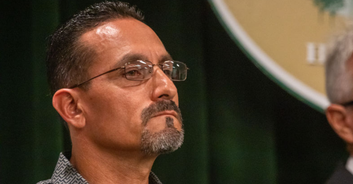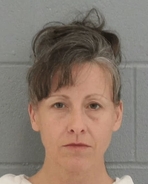In 2004, Cheryl Williams and her mother, Carol Bareis, were murdered in their Altamonte Springs home in Florida. Their neighbour, Clemente Aguirre-Jarquin - who was an undocumented immigrant from Honduras - discovered the scene, and rushed to check whether the two women were still breathing. He also picked up a knife near the bodies in case the killer was still nearby and he needed to defend himself. In doing so, he got covered in blood.
Just 24 years old at the time, Aguirre-Jarquin considered reporting the incident to the police, but decided against it as he feared that he would be forced to leave the country. Instead, he fled the scene, abandoning the knife in a nearby bush.
Of course, nobody believed this story and, two years later, he was sentenced to death for the crime.

For years, Aguirre-Jarquin maintained his innocence, and his case was finally picked up by The Innocence Project: a non-profit group that seeks to overturn wrongful convictions. They argued that Aguirre-Jarquin's attorney did not provide sufficient counsel at his trial, as no DNA testing was ever requested to look for other suspects.
Thanks to their aid, the case was revisited and, in 2016, the Florida Supreme Court overturned the Honduran's conviction thanks to new DNA evidence which suggested that Samantha Williams, the victims' daughter and granddaughter, was actually the one to have committed the murders.
Despite this, it still took another two years to fully exonerate Aguirre-Jarquin, as State Attorney Phil Archer decided to go ahead and pursue the man again for the same crime.
The nightmare finally ended on Monday, however, when Archer announced that he was dropping the charges. The Innocence Project has claimed his decision was influenced by new testimony that implicated Williams in the stabbings.
"While the State has serious concerns about the credibility of Mr. Aguirre-Jarquin's statement of facts regarding his participation in this incident, the State does not believe further incarceration of Mr. Aguirre-Jarquin is warranted or justified at this time. We appreciate the efforts of his attorneys in presenting this new evidence," Archer said in a statement given to WKMG.
Aguirre-Jarquin spent almost 15 years behind bars, 10 of them with a death penalty hanging over his head.
"Mr Aguirre was nearly executed for a crime he didn't commit," said Joshua Dubin, one of Aguirre-Jarquin's attorneys. "While we are overjoyed that his ordeal is finally over, the case of Clemente Aguirre should serve as a chilling cautionary tale about how dangerous it is when there is a rush to judgment in a capital case."
"I have only forgiveness in my heart for those who did wrong to me," Aguirre-Jarquin said in a statement released by the Innocence Project.
Sadly, the struggle is not yet over.
On Friday of last week, the U.S. Department of Homeland Security reportedly placed an immigration hold on Aguirre-Jarquin, meaning that the newly-exonerated man now faces possible deportation. He has no home, no job, and very little hope in Honduras - mostly thanks to the 15 years he spent wrongfully incarcerated in the USA.
"If there were ever a person that deserved a chance to become a United States citizen, it is Clemente Aguirre," said Dubin.
His lawyers plan to pursue an asylum claim for him.



